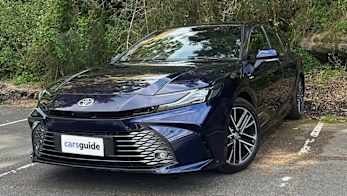Audi has revealed pricing and specs for its incoming Q6 e-tron mid-size SUV, a car which its local managing director Jeff Mannering has called “the most important car we’ve had in 10 years.”
Starting from $115,500 the Q6 will be the brand’s fully electric alternative to the Q5, which is Audi's best-selling model.
But right now, there’s precedent for things not working out for promising new EVs — especially ones in the luxury segment.
Mercedes, for example, had trouble moving units of its first fully electric model to hit Australian shores, the EQC 400, with the mid-size SUV ultimately being quietly discontinued earlier this year. The brand’s other EQ products have similarly been since shunned. Even Tesla is facing a sales slump at the moment with its Model Y.
On the other hand, BMW has had more success with its well-received iX1, iX3, and iX SUVs, which stray closer to the Bavarian marque’s historic design, paired with keen pricing.
Audi says the opportunity is a bit different for the Q6. The mid-size SUV is a part of a two-prong EV market attack paired with the smaller Q4, and it debuts an all-new architecture for the brand, the Premium Platform Electric (PPE) shared with the new Porsche Macan.
.jpg)
Additionally, it will debut an array of new design features and tech upgrades, while keeping true to the kind of design elements which Audi buyers expect.
And when it comes to the market, Audi’s executives say the environment in Australia has changed significantly since the arrival of vehicles like the EQC and the original e-tron SUV, especially with Australia’s recent new vehicle efficiency standards now bringing our market closer to European emissions laws.
“I think the big thing is, with, let’s call them new-ish electric vehicles, the Government’s moves with new regulations will change the [powertrain] mix of new cars.” said Matt Dale, head of product at Audi Australia, referencing Australia’s new vehicle efficiency standards (NVES) rules which impose tough CO2 targets on new vehicles.
.jpg)
“RS models, overall, have a small impact because we can have cars like [the Q6]. As each year goes by, these regulations get tougher. For the Audi brand, this means when we look at our whole model range, we can use those technologies from mild hybrid all the way through to plug-in hybrid and battery electric.
“We’ll see the mix [of BEVs] increase as those regulations get tougher.”
Adding to the improved chances for Q6 in 2024 compared to previous offerings in the space, Audi’s product planner Peter Studwicke said: “There’s becoming less objections from customers [compared] to when those BEVs were first out, the infrastructure is improving, the battery energy density is up 30 per cent compared to the first e-tron, they keep getting better so there are now less objections for people to taking the step into BEV if they haven’t before.”
.jpg)
“You still get heaps of customers which aren’t prepared to move to it and for that reason we have lots of ICE cars still, but I think it’s moving in that direction.”
What happens if consumers tell Audi they don’t want to follow NVES laws to a more electric future?
“It’s a balance," Dale said, “that’s why we’re trying to be so consumer focused, listening to what they want and keeping a broad product spectrum. If it doesn’t go all electric it’s having a sustainable business model with a flexible model range.”
.jpg)
“MHEV, and the incoming MHEV+, that gives us scope and the opportunity to check-in at touch points when regulations get stricter over time, and checking in on the market and customer feedback.”
To that end, the Q6’s new PPE underpinnings will be complemented by the arrival of its PPC (Premium Platform Combustion) counterpart which will underpin the next-generation Q5 later in 2025. Additionally, the brand’s new MHEV+ hybrid drivetrains will offer even further emissions reductions and fuel efficiency for its existing range of nameplates.
Importantly, off the back of its new array of powertrains, new-generation models and the arrival of more mainstream EVs, Audi Australia’s managing director, Jeff Mannering says “now is a great time” for the brand to have a crack at the number one spot amongst its German rivals which has eluded it for so long.
Still, Audi has its work cut out for it in 2025. Not only will it have to unseat BMW from a position of strength if it wants the coveted number one position, but it will also face more premium newcomers from China determined to eat into its market share, like Zeekr and Xpeng. Will its refreshed range hit home for its loyal buyers? Only time will tell.





.jpg)

.jpg)

.jpg)

.jpg)
.jpg)

.jpg)
.jpg)


.jpg)

_0.jpg)

.jpg)
.jpg)
.jpg)




.jpg)